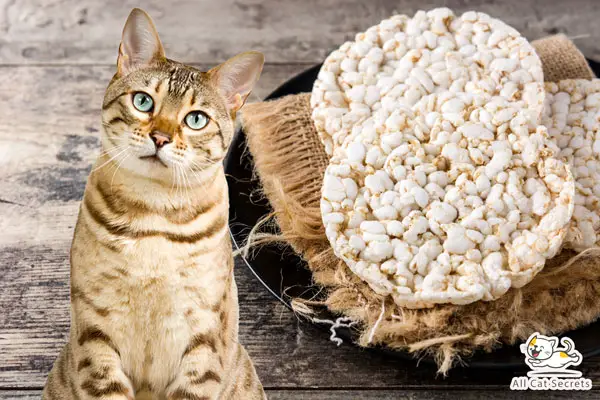Rice is one of the world’s most popular grains. It’s a staple food in over 30 countries. Rice is also one of the most versatile foods. It can be incorporated into a variety of recipes, including sushi, risotto, jambalaya, to mention but a few.
In fact, rice is so versatile that it feeds humans and animals alike. Rodents, birds, deer, and certain fish species are just a few examples of animals that can safely consume rice. But can the same be said about our feline friends? Can cats eat rice?
The short answer is yes, cats can safely consume rice. Rice doesn’t contain any toxic compounds known to be harmful to pets. The grain even packs several vitamins and nutrients that might benefit your kitto in some way. As a matter of fact, 23% of all wet cat food and about twice as much of dry cat food contains rice as a basic ingredient.
Can cats have rice cakes too?
Since cats can eat rice, it’s logical to conclude that they can eat rice cakes too. After all, rice is the most abundant ingredient in rice cakes.
However, it’s important to take certain precautionary measures when feeding rice cakes or any other rice-based foods to your feline friend. That’s primarily because a cat’s diet doesn’t typically include plant-based foods. A high consumption of rice could leave your adorable kitto nursing serious adverse effects.
Read on for more insights into the effects of rice on cats.
Table of Contents
What Should Cats Eat?
Cats are obligate carnivores, which implies that they mainly rely on nutrients in animal products. Ideally, a cat’s diet should comprise over 90% animal protein and moderate amounts of fats. A minimal amount of carbohydrates would also be necessary in aiding energy production.
Besides these three major food groups, your cat will also require a decent amount of essential vitamins and mineral salts, as well as antioxidants.
However, that cats are obligate carnivores doesn’t prevent them from safely consuming certain plant-based foods. Plants can help relieve indigestion and an upset stomach in cats.
In fact, even wild cats do snack on leaves and other green matter occasionally. The fact that the housecat has lived with humans for thousands of years means that he has been exposed to far more greens than his wild cousins. And that’s precisely why many plant-based foods are harmless and even potentially beneficial for cats.
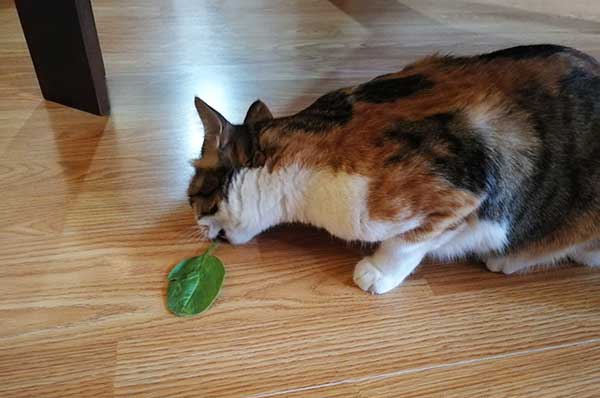 My Cat Sunny Playing with Spinach Leaf
My Cat Sunny Playing with Spinach Leaf
But is it OK to give cats rice cakes?
Rice cakes are generally safe for cats. But to truly understand the benefits of rice cakes for cats, it would be best to know what constitutes this food.
What’s In Rice Cakes?
Rice cake is a general term for any food made from rice that has been condensed, shaped or otherwise combined into one object.
Rice cakes can be made from whole-grain rice or rice flour. Whichever the form they assume, one thing’s for sure – these foods contain rice as the basic ingredient.
And that begs the question, are rice cakes ok for cats?
Well, rice cakes are okay for cats to the extent that these foods are made from rice, a grain not known to cause any immediate health issues in cats.
But should you proceed to share rice cakes with your cat based on that one premise?
Probably not. While rice cakes contain rice as their primary ingredient, these foods may also be prepared with ingredients considered toxic for cats. That includes spices like onions, garlic, and peppermint.
Health Benefits of Rice Cakes for Cats
The potential health benefits of rice for cats are unsurprisingly related to rice.
Rice contains a high dose of dietary fiber, including a soluble resistant starch known as butyrate. Butyrate can boost your cat’s gut health by nourishing the friendly bacteria living throughout the animal’s digestive tract, otherwise known as gut microbiome. According to research, keeping these microbiomes well-nourished is a natural way of reducing the risks of gut inflammation.
The high fiber content in rice cakes may also help boost your cat’s digestion. Studies have shown that fiber travels through the stomach undigested. In the process, it bulks up stool, increasing the frequency of bowel movements. Frequent bowel activity can help to ease indigestion and constipation.
However, note that fiber’s stool-bulking properties mainly apply to insoluble fiber, which happens to be more abundant in brown rice than white rice. So, you might consider giving your cat rice cakes made from brown rice to help the animal maximize on the food’s potential gut-related health benefits.
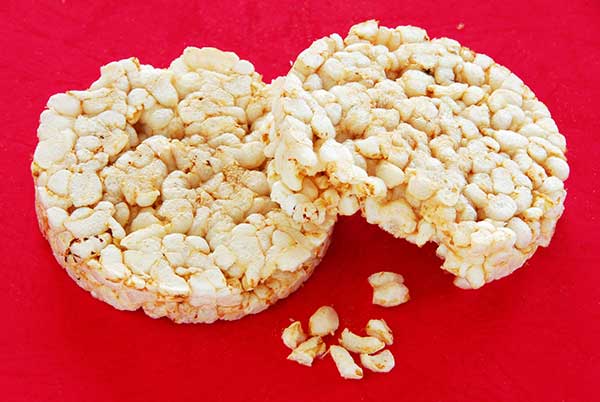
That begs another question, can cats eat brown rice cakes?
Brown rice simply refers to white rice but with the bran, husk, and germ still intact. It’s generally considered healthier than the more processed white rice. That also means rice cakes made from brown rice are potentially more beneficial to cats than those made using white rice.
However, in terms of digestibility, your adorable kitty would be safer with rice cakes made from white rice. While the bran, husk, and germ make brown rice potentially more nutritious, these components are unfortunately harder to digest. So, it’s all a balancing act between nutrition and digestibility.
Besides aiding your cat’s digestion, rice cakes may also increase his energy levels. Rice is famous for its high carbohydrate content.
Carbohydrate-rich foods, such as rice cakes, can help support your cat’s energy synthesis processes.
Are Rice Cakes Good For Cats Then?
Rice cakes are not necessarily bad for cats. In fact, rice cakes made with plain rice may pack a few health benefits for your feline friend.
But is that enough reason to share these foods with your kitto?
Maybe not. As you shall find, most rice cakes recipes include other ingredients known to be potentially toxic to cats.
Besides, rice still offers minimal nutritional benefits, considering that cats are obligate carnivores.
- High protein cat food dry formula with real chicken as the first ingredient
- Natural with prebiotic fiber nourishes specific intestinal bacteria for digestive health
- Wholesome cat food dry kibble with vitamin A and Omega-6 fatty acids to nourish skin and coat
Last update on 2025-01-18 / Affiliate links / Images from Amazon Product Advertising API
Dangers of Rice Cakes for Cats
At first glance, rice cakes may seem like any regular foods that cats can eat. After all, these cakes are primarily made of rice.
But the situation isn’t always as black and white as it sounds. As we’ve repeatedly mentioned, rice cakes may contain several other ingredients that could harm your cat.
Common rice cakes ingredients that cats shouldn’t eat include salt, sugar, and spices.
1. Effects of Salt on Cats
Salt is highly toxic to cats and even dogs. Exposure to too much salt might trigger a medical condition known as sodium ion poisoning.
Early warning symptoms of sodium ion poisoning in cats include nausea, vomiting, diarrhea, and reduced appetite. If unchecked, the condition might degenerate into more severe symptoms, such as lethargy and incoordination.
And without prompt medical intervention, sodium ion poisoning can begin to damage your cat’s kidneys. That’s when you’ll notice symptoms like excessive drinking and urination, elevated heart rate, high blood pressure, seizures, and coma.
The damage that salt can cause to your cat’s kidneys is the reason cats with kidney disease shouldn’t eat highly-salted rice cakes.
Are lightly salted rice cakes OK for cats?
A seemingly small amount of salt is usually what it takes to cause toxicity in cats. So, lightly salted rice cakes might still be unsafe for your kitto.
Can cats eat unsalted rice cakes then?
As far as salt concentration is concerned, cats should stick to unsalted rice cakes. Of course, provided that all the other ingredients in the cake are generally considered safe for cats.
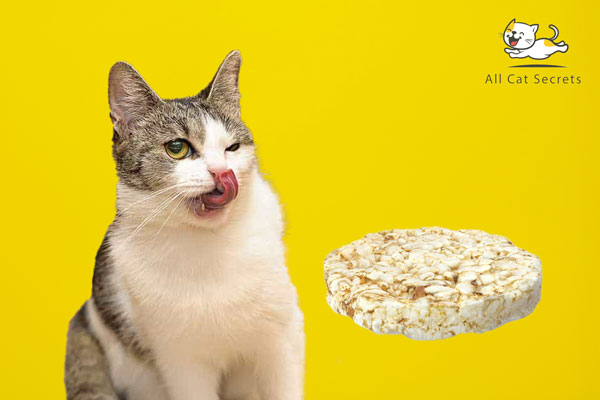
2. Effects of Sugar on Cats
Sugar is nearly as harmful to cats as salt is. Too much sugar in your cat’s diet can induce stomach irritation, commonly symptomized by vomiting and diarrhea.
Sugar-rich foods can also throw your cat’s blood sugar levels off balance. And it doesn’t help that rice is so high in carbohydrates.
Worse yet, sugar could open up your cat for various chronic diseases, such as obesity, diabetes, and heart disease. So, just as cats with kidney disease shouldn’t eat highly-salted rice cakes, diabetic cats shouldn’t consume sugar-rich rice cakes either.
3. Effects of Spices on Cats
Not all spices will cause immediate toxicity to cats. But some, particularly garlic and onions, can be highly dangerous for your feline friend.
The consumption of onion and garlic has been shown to cause hypersensitive reactions in a cat’s red blood cells. These spices can lead to a type of hemolytic anemia called Heinz-body anemia, a potentially fatal disease marked by oxidative damage to red blood cells.
Lethargy, paleness of the gums, and hypersalivation are the tell-tale symptoms of Heinz-body anemia. Some cats may also experience vomiting, diarrhea, and excruciating abdominal pain.
- CONTAINS: This pack of Delectables Squeeze Ups contains 32 (0.5 ounce eaches) squeezable cat treat tubes.
- INTERACTIVE TREATING: Squeeze Ups provide the purrfect bonding experience between you and your cat – this playful & interactive...
- PUREE TREATS: Each lickable treat tube is stuffed with a thick and creamy puree treat that is made from real poultry and fish.
Last update on 2025-01-18 / Affiliate links / Images from Amazon Product Advertising API
What Other Ingredients In Rice Cakes Can’t Cats Eat?
Besides being laced with salt, sugar, and spices, rice cakes may also contain several other ingredients considered unsafe for cats. Let’s examine those ingredients closely by answering a couple of frequently asked questions on cats and rice cakes.
Can Cats Eat Flavored Rice Cakes?
Rice cakes can contain a wide array of flavors. But as you’re about to find, some of these flavors could be harmful to your cat.
Can Cats Eat Corn Rice Cakes?
A small amount of corn isn’t harmful to cats. So, cats can eat corn rice cakes in moderation.
Can Cats Eat Apple Rice Cakes?
Apple is one of the many fruits that cats can safely eat. That makes apple-flavored rice cakes okay for cats to eat.
Can Cats Eat Cinnamon Rice Cakes?
Although inherently a spice, cinnamon isn’t known to cause immediate risks to cats. So, your feline friend can safely consume cinnamon rice cakes in moderation.
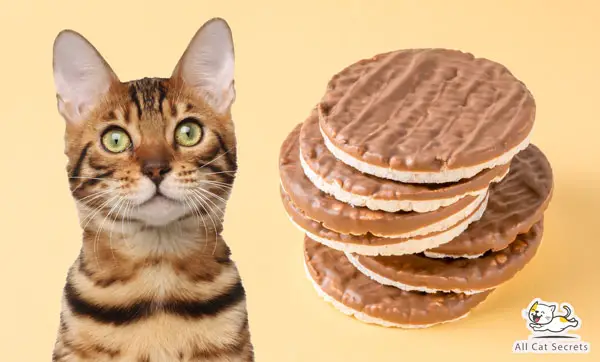
Can Cats Eat Chocolate Rice Cakes?
Chocolate is high in sugar. The product may also contain xylitol. Both compounds are considered dangerous to cats, which consequently makes chocolate rice cakes harmful.
Can Cats Eat Caramel Rice Cakes?
Caramels may be safe for cats in moderation but harmful if overfed. That’s due to their relatively high sugar content. So, caramel-flavored rice cakes should be fed to cats sparingly.
Can Cats Eat Salt And Vinegar Rice Cakes?
The mere mention of the word ‘salt’ makes salt and vinegar rice cakes potentially harmful to cats. Even the vinegar may not be so friendly to your cat’s stomach.
Can Cats Eat Marmite Rice Cakes?
Marmite tends to be high in salt. And as we’ve repeatedly mentioned, cats should stay away from salted rice cakes.
Can Cats Eat Yogurt Rice Cakes?
Yogurt is a dairy product and cats should generally avoid dairy products. That’s due to the presence of a simple sugar known as lactose in these products.
Note that cats are lactose intolerance. Therefore, exposure to this sugar could trigger gastric irritation.
Can Cats Eat Cheese Rice Cakes?
Cats shouldn’t eat cheese rice cakes. That’s for the simple reason that cheese is a dairy product, hence contain lactose.
Can Cats Eat Cheddar Rice Cakes?
Cheddar is simply a hardened type of cheese. Even without going into details, the mere fact that cheddar is a dairy product eliminates cheddar-flavored meals from a list of cat-friendly foods.
Other Frequently Asked Questions Related To Cats and Rice Cakes
Can Cats Eat Plain Rice Cakes?
Plain rice cake is healthier for cats than flavored one. That’s especially if you cannot vouch for the safety of the flavors used in the product.
Can Kittens Eat Rice Cakes?
Kittens should avoid rice cakes at all costs. Not until they’re old enough for their stomachs to handle plant-based foods.
Can Pregnant Cats Eat Rice Cakes?
Pregnant and nursing cats, as well as sick cats, should avoid rice cakes. That’s due to their suppressed immune systems.
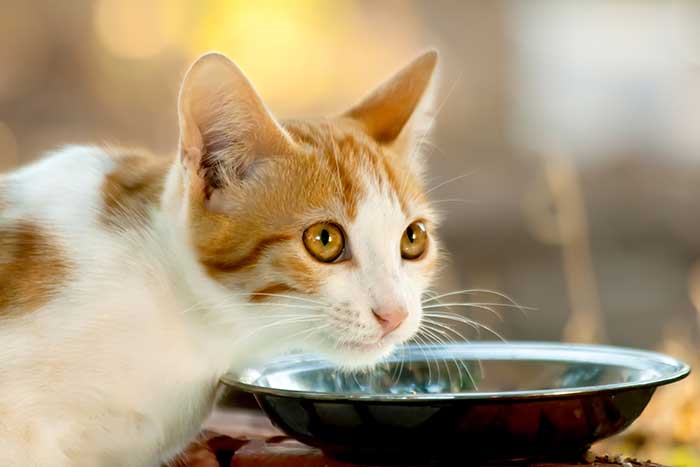
Conclusion
Rice cake is not toxic to cats. The cake may also pack some beneficial nutrients. But as with any plant-based foods, cats should only consume rice cakes in moderation.
Besides, rice cakes may contain potentially toxic additives. So, it’s best to examine the ingredients carefully before sharing this cake with your cat.
Checkout Our Favorite Cat Products
1. Best Online Course For Cat Parents
Our favorite: The Cat Language Bible (How to Finally Understand And Speak to Your Cat) – A new form of cat to human communication that many cat owners have dreamed about… but few have actually thought possible.
2. Best Immune Support For Cats
Our favorite: Tomlyn Immune Support – Best Supplement for Cats and Kittens.
3. Best Cat Treats
Our favorites: LIFE ESSENTIALS All Natural Freeze Dried Chicken And Sheba Meaty Tender Sticks – Both are Great.

